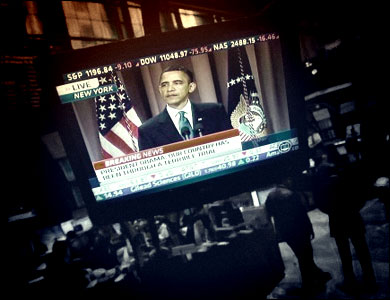Economy
See other Economy Articles
Title: Obama Re-election Prompts Largest Stock Market Drop in a Year (Marxist Kenyaphobia)
Source:
Infowars
URL Source: http://www.infowars.com/obama-re-el ... t-stock-market-drop-in-a-year/
Published: Nov 7, 2012
Author: Kurt Nimmo
Post Date: 2012-11-07 14:36:28 by Hondo68
Keywords: fiscal cliff looming ahead, unfunded entitlement liabiliti, 64 percent tax increase
Views: 537
Stock markets responded to Obama’s re-election by plunging today. The Dow tumbled below 13,000 as the S&P broke 1,400, beating this year’s drop on June 1. All S&P sectors are now mired in the red with financials and energy leading the charge. “The last time the market plunged as much: literally one year ago, or November 9, 2011. Sadly, it appears that one can’t have their Dow Jones Industrial Average and redistribute it too,” notes Zero Hedge. Wall Street had placed its bet on Romney and the Republicans because they promised to retain tax cuts and impose spending cuts. Republicans, of course, are not really interested in spending cuts, as Romney’s astronomical proposed increase in defense spending revealed. Market observers say downward stock activity is more a reaction to the so-called “fiscal cliff” looming ahead than Obama’s re-election per se. “I don’t think there’s a long-term market reaction to the presidential election itself–it’s now how quickly we can focus on the ‘fiscal cliff’ and coming up with a resolution,” Art Hogan, managing director of Lazard Capital Markets, told NBC News. The term “fiscal cliff” is shorthand for the economic situation the United States government will face on December 31, 2012, when the Budget Control Act of 2011 is scheduled to go into effect. It will introduce options for a balanced budget amendment, automatic budget sequestration, and the creation of the Congressional Joint Select Committee on Deficit Reduction, also known as the “super committee.” The law will not actually reduce the debt, but will supposedly slow down the existing rate of growth of the debt and will increase taxes on most Americans. The official debt stands at $16 trillion. The real debt, however, when unfunded entitlement liabilities are added into the equation, is $222 trillion. Eliminating the debt “via tax hikes would require an immediate and permanent 64 percent increase in all federal taxes. Alternatively, the government could cut all transfer payments, e.g., Social Security benefits, and discretionary federal expenditures, e.g., defense expenditures, by 40 percent,” writes The Daiy Ticker. Both options in the current political climate are, to say the least, untenable.
Poster Comment: 

Post Comment Private Reply Ignore Thread
[Home] [Headlines] [Latest Articles] [Latest Comments] [Post] [Mail] [Sign-in] [Setup] [Help] [Register]
